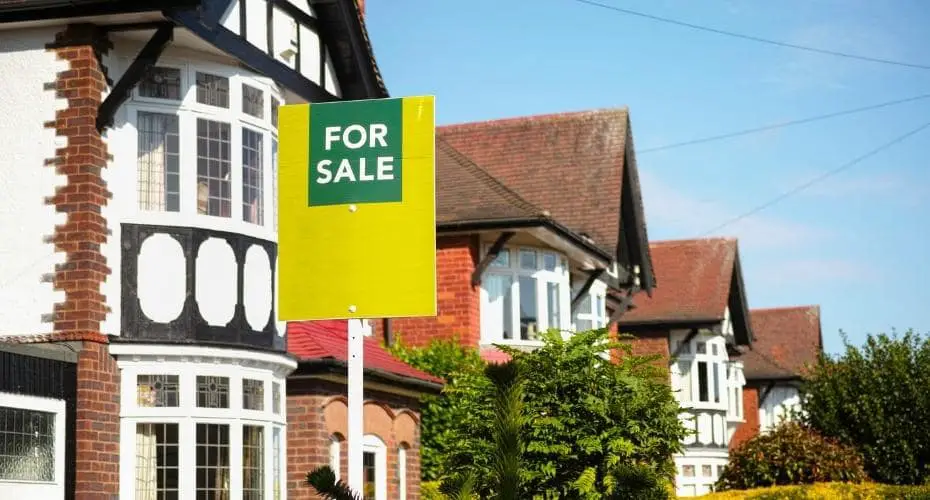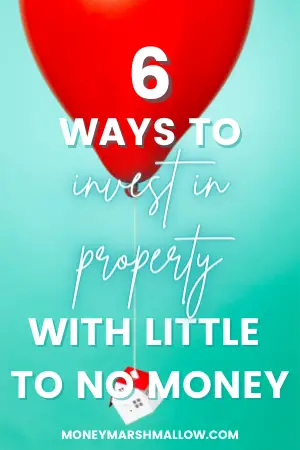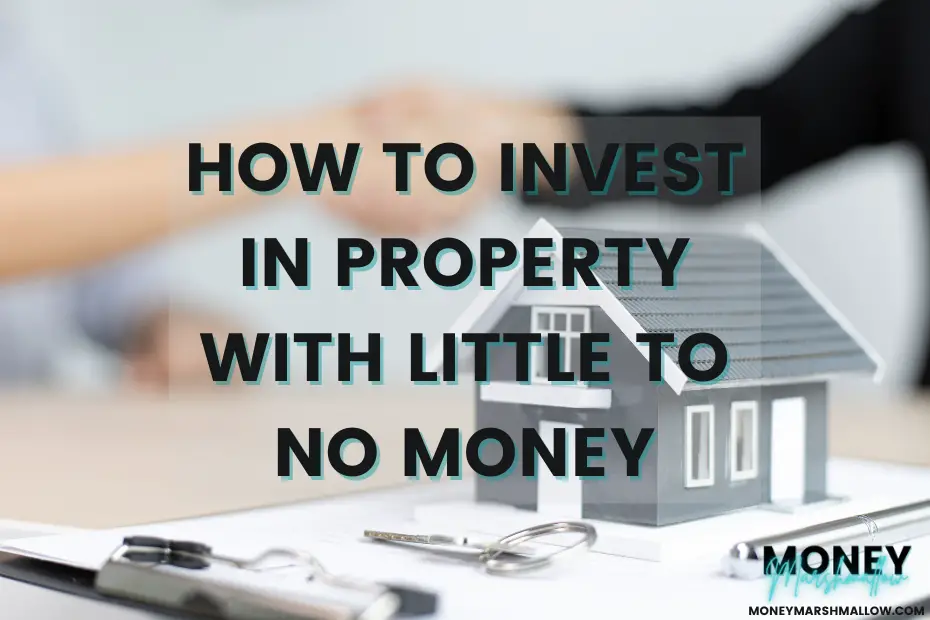While having a nice chunk of cash can certainly help you to get started with property investing, it’s not the only way. There are ways of investing in property with no or very little money down. If you’re tight on funds or just like to get creative, take a look at these six ways how to invest in property with little to no money.
Is it possible to invest in property with little to no money?
Traditional lenders often require a minimum deposit of 25% when you get a Buy to Let mortgage for a rental property. That can equate to tens of thousands of pounds just to get your foot in the door to owning your first rental property.
Fortunately, this expensive strategy is not the only way to invest in property. Contrary to common belief, you don’t need to have a lot of capital to start investing in property. There are various property investing strategies that in fact require little to no money.
“No money?!”, you might wonder. Let me clarify how this is possible: When you are buying a property with “no money down,” you are putting none or very little of your own money into the investment upfront. Instead, you can use other people’s money for a down payment or creative financing options to eliminate a down payment altogether.
The less money you have invested in a property, the higher the likelihood of an increased return. This is why savvy property investors use a number of the following methods to reduce how much they bring to the transaction.
6 ways to invest in property with little or no money
1. Lease option
The first way to invest in property with no money is through a lease option. The idea of a lease option is that you get the option to buy a property at some time in the future, within an agreed time period. In the meantime, you rent the property from the seller.
You agree to a small upfront payment for the process to be legal – this can be as little as £1. Then, you agree on a monthly payment to the owner. Instead of the market rent, the monthly payment is usually set at the amount that the owner needs to cover their costs. You will also set the length of the agreement with the owner and agree on a purchase price should you wish to buy outright after the fixed period.
While a small upfront investment might be required, you will get all the benefits of a solid rental income but without the hassle or cost of a mortgage. The other main benefit of lease options is that if the property price goes up beyond your agreed purchase price, you’ll gain instant equity.
The flip side of this strategy is that these properties can be hard to find. Naturally, this type of deal is not good for all homeowners. To find suitable properties for a lease option deal, investors typically look in areas with high negative equity. Another option is to find sellers who need to move quickly. These can be divorcees or relocators, for example.

2. Joint venture
The second way to invest in property with little to no money is joint venturing. You can work together with time-poor investors who put money into the deal. In return, you do all the work from finding a good deal to managing the property. So instead of you putting in money, you’re putting in your time and knowledge. You can either share profits 50/50 or agree on another arrangement you both see fit.
However, remember that property is a big commitment. Therefore, you don’t want to just invest with anyone. You need to make sure that you can do business together. For example, it might not always be the best idea to join a venture with a friend or a family member. A good way to start looking for joint venture partners is by joining investor communities and groups online and attending property investors networking events. A common mantra within these communities is that “if you find a good deal, that money will come”.
3. Property crowdfunding
Crowdfunding is another option to invest in property with little money. Property crowdfunding is where groups of investors pool their money so that everybody owns a share of the equity. There are two main ways of gaining returns from crowdfunding.
Firstly, you can invest in property developments where every investor receives a share of the gains from the sale of the development. These can generate higher returns faster. However, this option is also considered to be a riskier investment.
The other option is Buy to Let property crowdfunding. This works much like any other rental strategy, acquiring rental yields over time and sharing them between investors.
The main benefit of property crowdfunding is obviously that you can invest in property with far less money than you’d need to buy a rental property on your own. The minimum investment can be as little as £100 and is normally less than £1,000, depending on the platform.

4. Real estate investment trust (REIT)
A real estate investment trust (REIT) is a type of investment company that makes money for its investors through real estate. Both individual investors and companies can pool their money together to purchase property, benefitting from value increases and rental income.
Another way to think of REITs is like a mutual fund, but rather than investing in stocks, they invest in properties. REITs allow you to invest in various properties with a single investment. At the same time, the entire trust is managed by a large-scale exchange-traded fund (ETF) provider that will invest in different property types on your behalf.
Investing in a REIT allows you to benefit from the same income streams as a traditional real estate investment, such as capital appreciation and rental income. Investing in a REIT is passive and doesn’t require much money to start with.
The modest downside of REITs is that they take a chunk of the profits in administrative fees before distributing the remainder to shareholders.
5. Deal packaging
While deal packaging is not a property investing strategy as such because you don’t own or manage a property, it can be a great way to make money from property.
Deal packaging, also known as property sourcing, is the one strategy that is solely about producing cash. It can be a lucrative career on its own or a temporary way to make money that you will then invest in property.
So what is deal packaging? In short, it’s about finding profitable property deals and matching them with suitable investors. It can be as simple as sourcing a suitable property deal for investors (deal sourcing). In addition to sourcing, you can provide services like researching different areas, comparing the prices with its competition or even property management (deal packaging).
When an investor buys a property you have found for them, they will pay you a fee for sourcing the deal. You don’t have to worry about raising any money because the investor will provide all the money required to buy the deal.
The amount of the sourcing fee usually depends on the property prices and the level of services provided. Many deals are sold for between £2,000 to £5,000 per deal. One deal a month could therefore comfortably replace the income of most 9 to 5 jobs!

6. Rent to rent
Rent to rent (R2R) is another investment strategy that is predominantly about producing cash (that you can then use for other property investing strategies). Unlike deal sourcing, this strategy does require some money to get started.
Rent to rent means renting a property from a landlord and then renting it out to a third party. For example, this could be a three-bed house with two reception rooms that can be turned into a five-bed house share with a decent profit margin. Alternatively, sub-letting to short-term tenants through the likes of Airbnb is another profitable business model.
Related: How to make money on Airbnb without owning property
There are plenty of landlords who are happy with this arrangement as long as the rent is paid each month. As such, it’s common for the renter to offer the landlord guaranteed rent in return for permission to sublet. You will take on the responsibility of managing their tenants and property maintenance while making a profit. It’s a win-win for both.
But isn’t subletting illegal? There are actually several ways to legally sublet a property. Usually, this involves commercial or corporate tenancies or management agreements.
Property investing with little or no money
Property investing can offer a unique combination of safety, an alternative stream of income and a strong likelihood of high capital gains. A well-planned and executed real estate investment can generate an ongoing passive income. It can also prove to be a good long-term investment if the property value increases exponentially over time.
With the ever-increasing house prices in the UK, it might feel impossible to get on the property ladder, never mind starting an investment portfolio. But as we have learnt by now, there are various ways you can invest in property with little to no money of your own.
If you’re new to property investing, it’s critical to do further research and learn from experienced investors before getting started.

